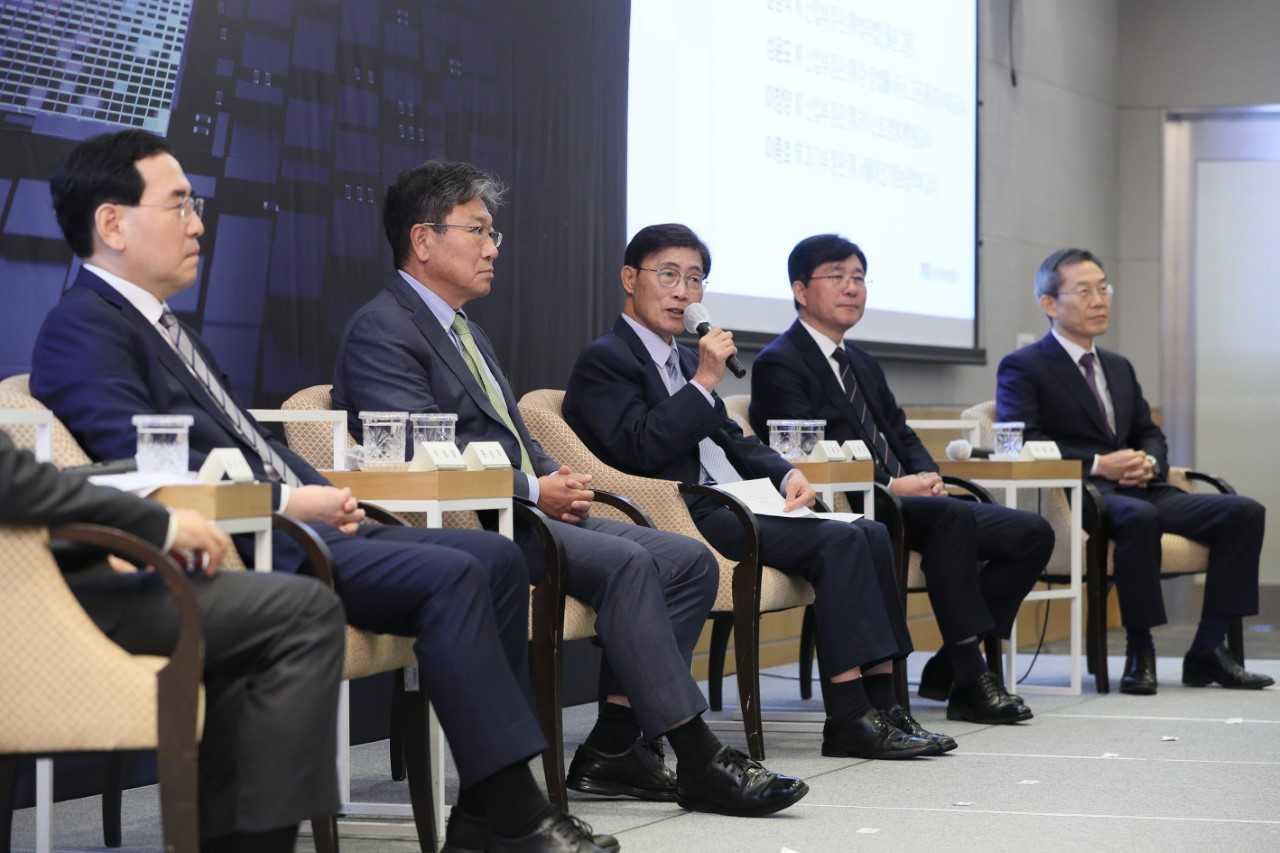 |
From left: Former Industry ministers Lee Chang-yang, Yoon Sang-jik, former Knowledge Minister Lee Youn-ho, former Industry Minister Sung Yun-mo and former Science Minister Lee Jong-ho attends a special panel discussion at Federation of Korean Industries headquarters in Seoul on Monday. (FKI) |
Former industry and science ministers urged the government to take a more proactive approach to support the domestic chip industry, including providing direct subsidies, to maintain an edge in the intensifying global semiconductor race.
Five former ministers and chip experts on Monday discussed the future of Korea's chip industry at a special panel discussion organized by the Federation of Korea Industries in Seoul, where they agreed on the need for "all-around" support from the government to prevent Korean chipmakers from "following the course of Toshiba and Intel."
Kim Chang-beom, vice chair of the FKI, noted how the US, China and Japan are providing massive subsidies and tax incentives to boost their domestic chip industries, and called for the government to come up with similar financial support programs.
"If this trend continues, Korea's chip manufacturing capacity will fall behind Taiwan and China. There is also a sense of crisis that we will lose the battle for leadership in the advanced chip sector, including artificial intelligence," Kim said.
Hwang Cheol-seong, chair professor of materials science and engineering at Seoul National University, said Korea's competitive edge can be weakened in the near future, as the current 2D-scaling DRAM development process adopted by Korean chip giants will face limitations in the next five years.
“A shift to a stacked 3D DRAM structure, similar to vertical NAND flash chips, is inevitable. ... The slow development of Korea's logic chip industry and potential decline in the memory chip sector poses risks for the future," Hwang said.
He also warned of Chinese companies quickly making inroads into the global memory market, backed by strong government support.
Market tracker TrendForce reported that Chinese firms only secured a 6-percent share in the global memory chip market in the July-September period, but that figure is expected to increase to 10.1 percent in the third quarter next year.
Lee Youn-ho, who served as the minister of knowledge economy from 2008 to 2009, said governmental support for the semiconductor industry should not be taken as "favorable treatment" for individual companies.
“The governments of the US, China and Japan decided to provide massive subsidies (for their domestic chip industries) because semiconductors go beyond an industry directly linked to a nation’s competitiveness,” Lee said. "The chip industry is also closely related to national security, given that more than 90 percent of the modern military technologies rely on chip technology.”
Yoon Sang-jik, former industry minister from 2013 to 2016, explained that the four preconditions of workforce, funds, electricity and data should be fulfilled for the development of the chip industry, and pointed out the country’s poor electricity supply conditions.
“By 2030, the country will require more than 50 percent of the current power generation capacity (about 144 gigawatts as of 2023),” Yoon said. According to Yoon, the world’s largest semiconductor cluster currently being built in the city of Yongin alone will require at least 10 GW of electricity and new data centers will demand a total of 49 GW of power by 2029.
“Through the enactment of special legislation, we should quickly complete the delayed construction of power transmission networks, build new nuclear power plants as well as speed up the commercialization of next-generation small modular reactors," Yoon said.
Recognizing the fast-changing industry, especially with the rise of AI technology, Lee Chang-yang highlighted the importance of the government's role in boosting the competitive edge of Korean chipmakers with support policies. Lee served as the industry minister from 2022 to 2023.
Lee Jong-ho, a chip specialist who served as science minister from 2022 to 2024, highlighted on the need for technological innovation for power-efficient chips in the AI era.
"Through collaboration among academia, industry and research institutes, we should develop low-power chips to reduce the massive energy consumption of AI," he said. Lee also underscored the need to build computing infrastructure for universities and the creation of funds to support AI technology companies.
"The cases of Toshiba and Intel show how failure in innovation and mistakes in investment and lack of support can lead the once dominant companies to collapse," Lee Sang-ho, vice president of the FKI's Economic and Industrial Research Department said.
Toshiba was once the world’s No. 1 NAND flash memory chipmaker in the early 2000s, but it ended up exiting the stock market in December 2023, ending its 74-year history as a listed company.
Intel is also a leading integrated device manufacturer, once dominating the central processing unit market with a market share of 82.6 percent in the third quarter of 2016. Now, the company is struggling to ends meet and recorded a net loss of $1.61 billion in the second quarter of 2024, and is moving to spin off its money-losing foundry business.







